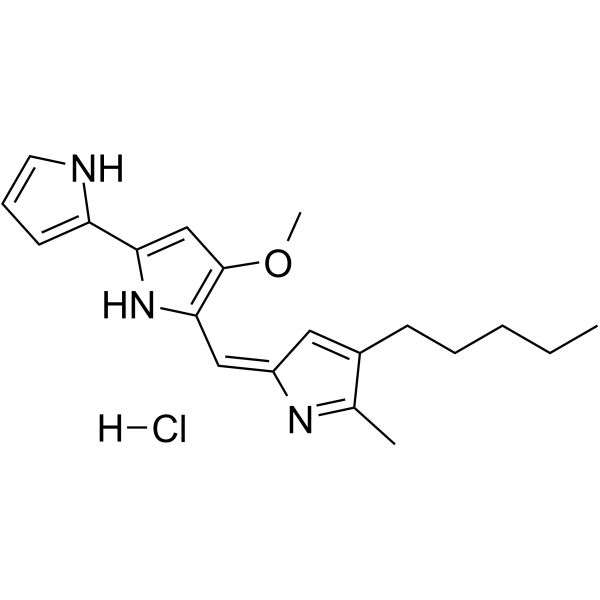Prodigiosin hydrochloride |
| Catalog No.GC65066 |
Prodigiosin(Prodigiosine) 염산염은 박테리아에 의해 생리활성 2차 대사산물로 생성되는 적색 색소입니다.
Products are for research use only. Not for human use. We do not sell to patients.

Cas No.: 56144-17-3
Sample solution is provided at 25 µL, 10mM.
Prodigiosin (Prodigiosine) hydrochloride is a red pigment produced by bacteria as a bioactive secondary metabolite. Prodigiosin hydrochloride is a potent proapoptotic agent, and inhibits Wnt/β-catenin pathway. Prodigiosin hydrochloride has antibacterial, antifungal, antiprotozoal, antimalarial, immunosuppressive, and anticancer properties[1][2].
Prodigiosin (25-500 nM; 24 hours) treatment reduces the viability of breast cancer cells, with IC50 values at 48 h of 62.52 nM in MDA-MB-231 cells and 261.2 nM in MDA-MB-468 cells[1].Prodigiosin (25-500 nM; 24 hours) treatment significantly reduces the levels of phosphorylated LRP6 and DVL2, active β-catenin, and total β-catenin. Prodigiosin noticeably inhibits the phosphorylation of GSK3β at Ser9 in HEK293T cells, which is indicative of an increase in GSK3β activity[1]. Prodigiosin can inhibit proliferation and induce apoptosis in breast cancer cells[1].Prodigiosin (25-500 nM; 24 hours) treatment dose-dependently blocks Wnt signaling activated by Wnt1, Wnt3, Wnt1/LRP6, Wnt3/LRP6, and Dishevelled 2 (DVL2) in transfected HEK293T cells. Prodigiosin treatment inhibits Wnt3A-CM-induced transcription in a dose-dependent manner. Prodigiosin inhibits transcription of the SuperTopFlash reporter activated by either Wnt transfection or Wnt3A treatment[1].When applied to cultures of chytrid fungi Batrachochytrium dendrobatidis and B. salamandrivorans, Prodigiosin causes significant growth inhibition, with MIC values of 10 μM and 50 μM, respectively[2].
Prodigiosin (5 mg/kg; intraperitoneal injection; twice weekly; for 3 weeks) treatment significantly inhibits tumor growth. Prodigiosin treatment decreases tumor cell density and expression of the proliferation marker Ki-67[1].
[1]. Wang Z, et al. Prodigiosin inhibits Wnt/β-catenin signaling and exerts anticancer activity in breast cancer cells. Proc Natl Acad Sci U S A. 2016 Nov 15;113(46):13150-13155.
[2]. Woodhams DC, et al. Prodigiosin, Violacein, and Volatile Organic Compounds Produced by Widespread Cutaneous Bacteria of Amphibians Can Inhibit Two Batrachochytrium Fungal Pathogens. Microb Ecol. 2018 May;75(4):1049-1062.
Average Rating: 5 (Based on Reviews and 30 reference(s) in Google Scholar.)
GLPBIO products are for RESEARCH USE ONLY. Please make sure your review or question is research based.
Required fields are marked with *




















